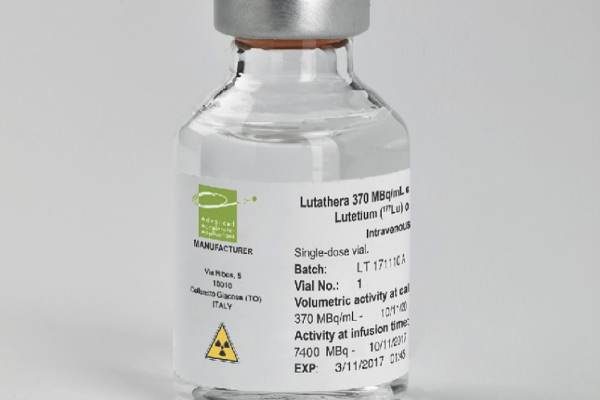Roswell Park’s NET Biobank fuels research toward better understanding of this commonly misdiagnosed cancer.
Neuroendocrine tumors (NETs) are uncommon cancers that are commonly misdiagnosed as another condition causing delays in diagnosis and care. In fact, about half are not properly diagnosed until later stages, when the cancer has spread to other areas and is far more difficult to treat, says Renuka Iyer, MD, former medical oncologist, NET expert at Roswell Park Comprehensive Cancer Center.
Neuroendocrine cells as the name suggests, receive signals from your brain like nerve cells and can make hormones like endocrine cells. Neuroendocrine cells can be found throughout the body, but they are mainly in the gastrointestinal tract such as the pancreas, appendix, small intestine and rectum, the lungs and thymus. Other less common areas include the thyroid, parathyroid, adrenal and pituitary glands.
Why is diagnosis so tricky?
NETs often don’t cause symptoms early in the disease. When symptoms do occur, they can be similar to those of other common medical conditions. Different types of neuroendocrine tumors cause different symptoms, depending on their location and whether the tumor secretes hormones and which hormones. “Nonfunctional NETs do not secrete hormones,” Dr. Iyer says. “They may produce symptoms caused by physical compression from the tumor's growth. But functional NETs cause clinical symptoms due to excess hormone secretion by the tumor. Because NETs are perceived to be uncommon and may be nonspecific in their presentation, delays in diagnosis and misdiagnosis are frequent.”
What symptoms should prompt a visit to the doctor?
Some people may have no symptoms at all. Some of the common symptoms include:
- Diarrhea (including at night)
- Flushing (redness of the neck and face)
- Abdominal pain or cramping
- High blood pressure
- Fatigue
- Headache
- Nausea and/or vomiting
- Pain from growing tumor
- Weight loss
Due to the lack of a screening test to detect NETs, it is very important to tell your doctor about the specific symptoms that you are experiencing. “The key to accurate diagnosis of NETs is having a complete picture of the patient’s symptoms,” Dr. Iyer says. “If your doctor suspects a NET, further evaluation including blood tests, urine tests, imaging tests and biopsy can be performed to confirm the diagnosis. Putting the findings in the right perspective and listening to the patients’ symptoms is key.”
“The diagnosis and treatment of a NET requires a coordinated multidisciplinary approach involving an expert team of specialists including medical oncologists, surgeons, interventional radiologists, pathologists, nutritionists, social workers and other healthcare staff,” Dr. Iyer says. “Results from pathology testing, hormonal testing, and diagnostic and functional imaging are integrated to form a complete diagnostic picture.” Roswell Park Comprehensive Cancer Center brings together experts in these fields who take a comprehensive approach to NET diagnosis and treatment planning. Additionally, an expert team of genetic counselors and supportive care specialists offer resources and guidance to patients and their families.
Roswell Park’s Theranostic Center
Theranostics employs methods and tools of diagnostic testing to deliver advanced cancer therapies, specifically for your neuroendocrine tumor.
What is the NET Biobank?
Because NETs are so rare, it’s difficult for researchers to assemble enough cases to study and come to meaningful conclusions about risk factors, how these tumors grow and how best to detect and to treat them. This is why Roswell Park established the NET Biobank which collects tumor specimens, blood samples and biographical data from patients with neuroendocrine tumors to fill this big gap in knowledge.
“The role of diet, nutrition, obesity, lifestyle habits is linked to different types of cancer but their exact contribution towards NETs is currently unknown. We lack studies related to the long-term impact of NET diagnosis and treatment on overall wellness, finances and survival,” Dr. Iyer says. “To address these needs of the field, we developed a patient-driven national biobank to collect sociodemographic and treatment information, tumor tissues from all surgical specimens over the patient’s treatment course and blood samples for genetic and immune studies.”
Scientists at Roswell Park, in conjunction with external collaborators with NET expertise throughout the nation, use the data and specimens from the BioBank to advance our understanding and provide a foundation for future research.
How can patients participate?
Any individual over 18 years of age with a personal history of neuroendocrine tumor is eligible to contribute to the NET Biobank. Start by completing the Prescreen Form. Individuals who meet the eligibility criteria will then complete further paperwork to be entered into the database.
The latest advancements for NETs
Along with a team of dedicated NET experts, with nearly 20 years of experience in diagnosing and treating NET patients, Roswell Park is a leading center for NET care, committed to giving patient-centered care and holistic approaches to treatment. In addition to development of this bank, the team is very actively involved in NET research, including multiple clinical trials for NET patients.
Roswell Park offers cutting-edge technology for diagnosis and surveillance of NET patients, including the latest PET scans using radiopharmaceuticals, such as gallium-68 dotatate (NetSpot®) and copper-64 dotatate scan. Roswell Park was also one of the first cancer centers to offer treatment with lutetium 177 dotatate (Lutathera®), a targeted radiation drug for patients with NETs that develop in the gut and pancreas. This nonsurgical treatment option is given intravenously once every 8 weeks for a total of four doses. These latest drugs are a new type of therapy approach called Theranostics. Roswell Park recently built a new Theranostics Center to accommodate the growing number of patients who can benefit from these treatments.
Multiple clinical trials are available for NET patients, that offer access to treatments unavailable from other providers, such as a treatment vaccine for patients with metastatic neuroendocrine tumors, nanoliposomal irinotecan, various novel agents and immunotherapy trials.


